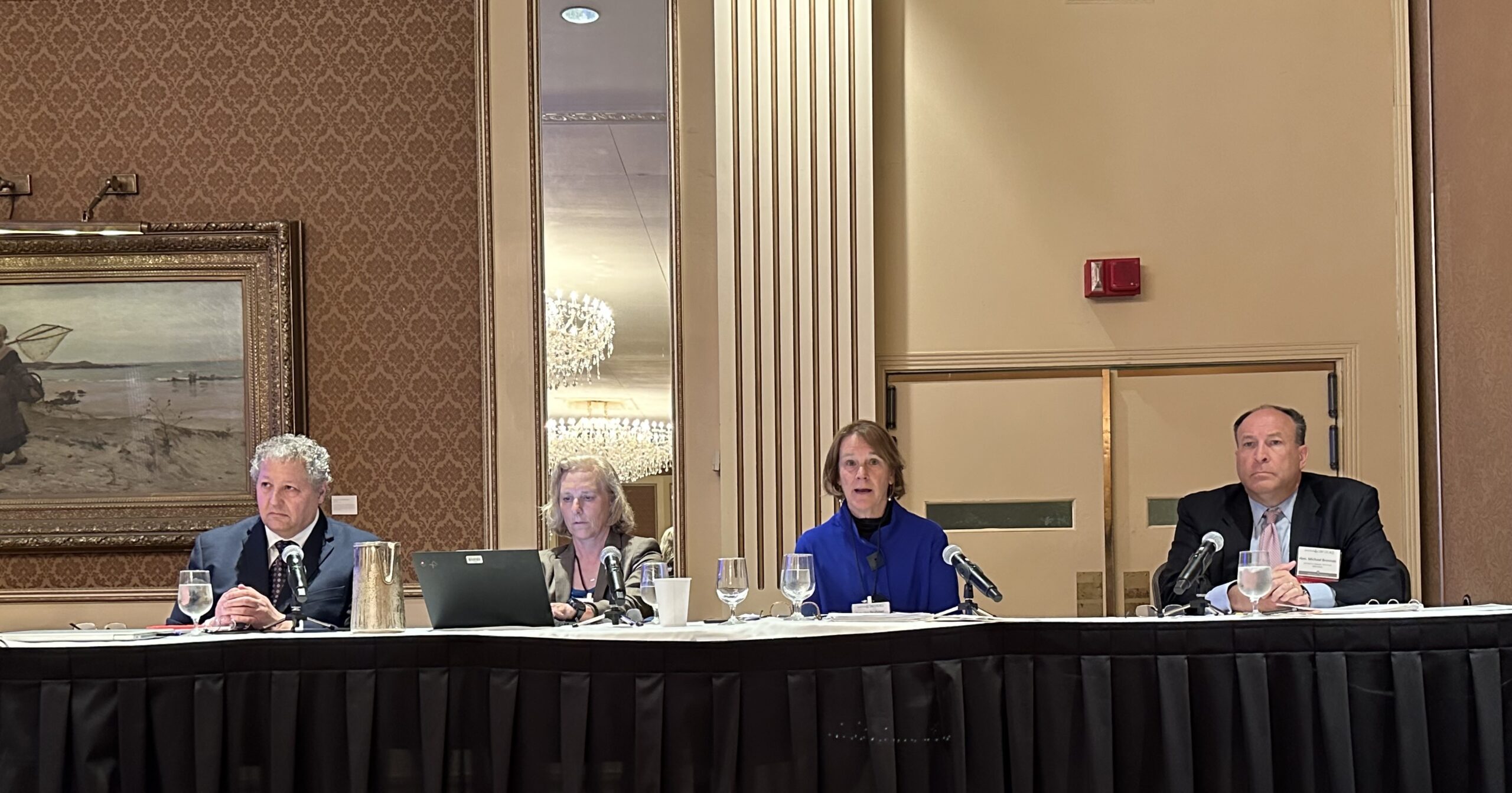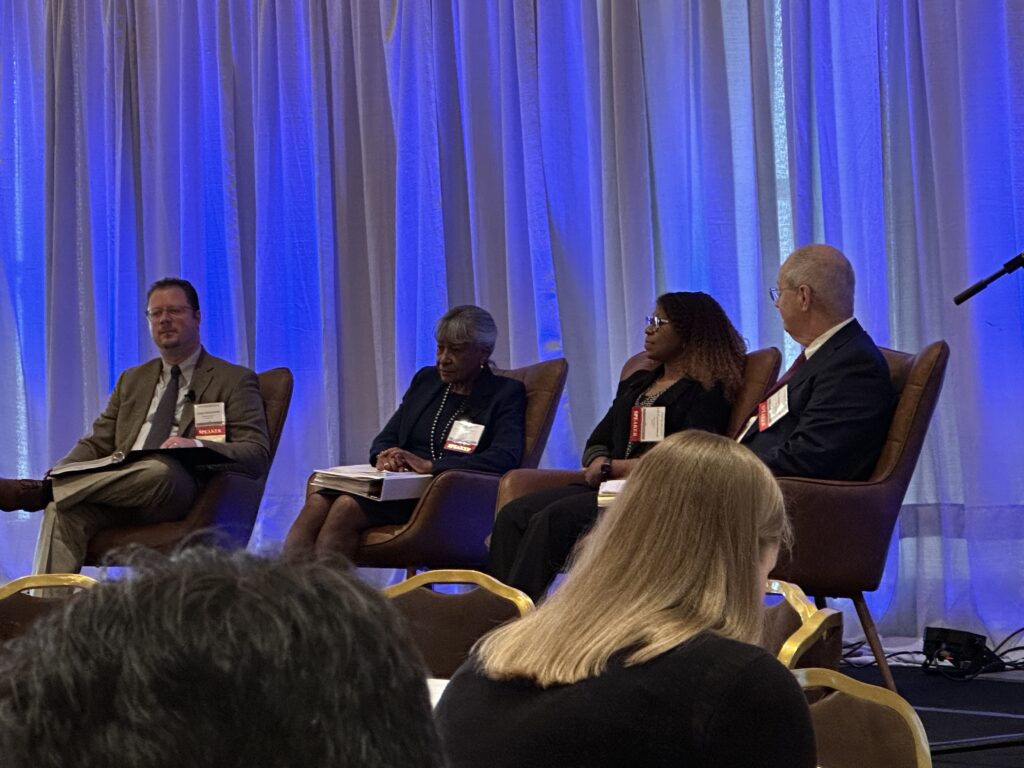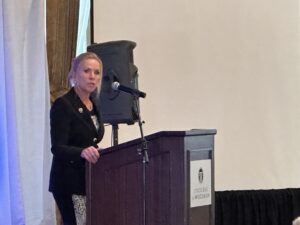Day 2: State Bar of Wisconsin Annual Meeting and Conference – Awards, CLE, Networking
By: Steve Schuster, [email protected]//June 15, 2023//
Day 2: State Bar of Wisconsin Annual Meeting and Conference – Awards, CLE, Networking
By: Steve Schuster, [email protected]//June 15, 2023//
Published 10:33 p.m. CDT, June 15, 2023.

By Steve Schuster
The second day of the State Bar of Wisconsin’s Annual Meeting and Conference in Milwaukee began with an opening plenary session on cancel culture.
Times have sure changed in the Badger State and throughout the nation panelists pointed out Thursday.

Panelists discussed how when someone reads a newspaper article they disagree with, some readers just cancel their newspaper subscription. Disagree with a judge’s decision? Just file a petition for his or her removal. It’s a whole new “cancel culture” world, panelists pointed out.
“One viewpoint praises the phenomenon for holding the ‘canceled’ accountable and protecting oppressed groups from offensive speech, while another viewpoint criticizes the movement for suppressing freedom of speech and operating as a disproportionate sanction mechanism,” the State Bar wrote ahead of Thursday’s discussion.
James Goldschmidt, the panel’s moderator with Quarles, read straight out of the dictionary – the definition of cancel culture. In response, Hon. Janice Rogers Brown, (Ret.) United States Court of Appeals for the District of Columbia Circuit, said she believes this is progress – merely that a dictionary has a definition of the term.
“People are accepting that there is such a thing (as cancel culture),” said Brown.
Later in the discussion the panel began to address the validity and impact to freedom of speech.
“There’s a partial truth in the cancel culture narrative,” said Prof. Franciska Coleman, Assistant Professor of Constitutional Law at University of Wisconsin Law School.

“For me part of the core of the idea of accountability culture is broadening the definition of what counts as free speech harm,” Coleman added.
The panel also addressed timely cases such as Missouri v. Biden – regulating social media and recent Disney litigation.
“The Magic Kingdom strikes back,” Goldschmidt said in jest.
Hon. William C. Griesbach, United States District Court, Eastern District of Wisconsin who was also on the panel said he believes it’s wrong for the government to retaliate against someone for exercising their First Amendment rights in the context of the Disney case, in which Disney filed the First Amendment lawsuit against the Florida governor, and the DeSantis-appointed board in April, claiming violations of free speech and the contracts clause.
During an afternoon Continuing Legal Education (CLE) session on appellate advocacy, jurists across state and federal courts provided advice on lessons learned from other attorneys’ mistakes.
The discussion began with a video introduction by Justice Ann Walsh Bradley explaining how the jurists on the panel would explain what they look for when reviewing appellate briefs and oral arguments.

The panel’s moderator Mark A. Cameli with Reinhart Boerner Van Deuren SC, Milwaukee asked what’s “the secret sauce” to an effective brief.
In response, Wisconsin Supreme Court Justice Jill J. Karofsky said that those who are good at oral arguments can also be good legal writers and recommended the book ‘Thinking Like a Writer.’
During the discussion, Judge Michael B. Brennan Seventh Circuit Court of Appeals addressed some of the benefits of mediation.
“You have so much more control during the course of a mediation to get a resolution,” Brennan said.
During the panel discussion on mediation, audience member Donald J. Wall said, “the important thing to remember is that if you are mandated or ordered to participate in mediation you must go, but if you are not ordered to do so as Judge Brennan indicated, you can ask. You can ask confidentially to be a part of the mediation process. So the other side doesn’t know. The other side might think I got ordered to do so.”
Wall serves as Counsel to the Circuit Executive at United States Court of Appeals for the Seventh Circuit.
Brennan also provided guidance for navigating the Federal appellate system.
He said clerks are available to answer questions via telephone (not provide legal advice) and there’s also a practitioner’s handbook with a new version slated for release later this year. Brennan added that Wall has been instrumental in the production of the handbook.
“That’s a 250-page bible of how to get through our Court,” Brennan added, noting it’s available on the Court’s website.
Judge Lisa S. Neubauer, Wisconsin Court of Appeals District II, pointed out the typically the Appeals Court “flies under the radar” and is a “modest, error correcting Court.”
Neubauer provided guidance for success on the appellate level.
In order for an appeal to be more successful, “you need to look at the case through the same lens we look through,” said Neubauer.
Neubauer also said there are elements that are fundamental to every appeal.
- What is the standard of review?
- Were errors preserved?
- Were issues raised below?
- Is there a harmless error issue?
“The other problem that we see very frequently that has to factor into your decision on what to appeal … we get all sorts of appeals like oops we forgot to do it … forgot to make that objection to that hearsay, but Court of Appeals you can fix this … I think this is very frustrating for litigants, they want to get it right,” Neubauer added.
Karofsky initially introduced herself to the audience as the junior justice on the Court, noting that in six weeks Justice-elect Janet Protasiewicz will be the newest addition to Wisconsin’s highest court.
“The hazing has begun,” Karofsky said, jokingly. Protasiewicz “has been told she has to get coffee every morning,” she added.
When asked about rule adherence or mistakes that attorneys have made that are problematic Karofsky said she generally subscribes to the belief that “it’s better to beg forgiveness than to ask for permission,” however, “I think in this instance though, you’re way better off if you ask for permission before you file the brief that exceeds the page limits.”
Karofsky also pointed out that what works for her is not necessarily the preference of her colleagues on the Wisconsin Supreme Court. One example Karofsky provided was that she prefers a Table of Content and reads everything on her computer, where another colleague does not require a Table of Contents.
The jurists discussed other common mistakes attorneys make and stressed the importance of knowing your audience.
“One of the fundamental mistakes that we see. … People put facts in (briefs) that we don’t care about,” said Neubauer.
Another mistake, not answering questions.
“When we do have oral arguments, we do it for a reason. It’s almost always because we have questions about legal issues. … The one thing that I would say is very frustrating is when lawyers come in and they don’t answer the questions. To me that is the most important thing. You have to anticipate where your case is weak and where you are going to get questions. And, you have to anticipate to answer (questions) not like a politician … and not answer the question, you are going to answer like a lawyer, and we will know if you aren’t answering the questions,” Neubauer added.
When discussing effective oral arguments, Karofsky made a joke, “I think it takes a lot of courage to get up in front of the Wisconsin Supreme Court at 9:45 a.m. … you are in front of 7 of the most highly overly caffeinated justices on the planet.”
In closing, Karofsky’s last piece of advice for giving oral arguments – “don’t be disrespectful.”
“We had one litigant come in and said good morning Justice Hagedorn and ladies,” Karofsky said.
Throughout the day Thursday there were a number of CLE sessions on topics ranging from Mediation and Marcy’s law to civility and criminal law.
Thursday’s events concluded with an awards celebration with Wisconsin Supreme Court Chief Justice Annette Kingsland Ziegler.

Thursday’s awards include:
Judge of the Year – Hon. Richard Radcliffe
Lifetime Jurist – Hon. Ramona Gonzalez
Charles Dunn Wisconsin Lawyer Author Award – Kelsey Mullins
Pro Bono Attorney of the Year and Pro Bono Organization of the Year – Atty. Jennifer Binkley and Rural Access to Justice
Diversity & Inclusion Trailblazer Award – Diversity & Inclusion Trailblazer Award – Hon. Carl Ashley
Dan Tuchscherer Outstanding Public Interest Law Attorney – Atty. Eugenia Hedlund
Ryan Klesh Public Interest Legal Worker Award – Lue Yang
Outstanding Public Interest Law Students – Tessa Henson – Marquette Law School and Taylor Dahlke-Forman – UW Law School
Government Lawyers Division Service Award – Atty. Michael May (posthumously)
Nonresident Lawyers Division Founders Award – Atty. Anu Chudasama
Senior Lawyers Division Leonard Loeb Award – Atty. Michael May (posthumously)
Young Lawyers Division Outstanding Young Lawyer Award – Atty. Lisa Procaccio
Young Lawyers Division Mentoring Award – Atty. Jason Luczak
As previously reported by the Wisconsin law Journal, Wednesday the State Bar of Wisconsin kicked off its annual meeting and conference at The Pfister Hotel in downtown Milwaukee.
New State Bar President Dean Dietrich was sworn in Wednesday afternoon.
Earlier in the day Wednesday at a Board of Governors’ Awards Luncheon, Wisconsin Supreme Court Justice Patience Roggensack spoke.
After Wednesday’s luncheon, a Board of Governors’ Meeting was held and Director of State Courts Judge Randy Koschnick spoke on a number of topics including, District Attorney and Public Defender salaries, Wisconsin Department of Justice’s crime labs budget, and cybersecurity.
Only 31 minutes into the Board of Governors’ meeting, a motion passed to move into closed session after the judge’s speech concluded.
A number of CLE sessions were held Wednesday, including: document management and retention, winning the war on talent, and Cybersecurity for law firms.
The Milwaukee Annual Meeting and Conference will conclude Friday, June 16 at 12:30 p.m.
Legal News
- Wisconsin attorney loses law license, ordered to pay $16K fine
- Former Wisconsin police officer charged with 5 bestiality felony counts
- Judge reject’s Trump’s bid for a new trial in $83.3 million E. Jean Carroll defamation case
- Dozens of deaths reveal risks of injecting sedatives into people restrained by police
- The Latest: Supreme Court arguments conclude in Trump immunity case
- Net neutrality restored as FCC votes to regulate internet providers
- Wisconsin Attorney General asks Congress to expand reproductive health services
- Attorney General Kaul releases update at three-year anniversary of clergy and faith leader abuse initiative
- State Bar leaders remain deeply divided over special purpose trust
- Former Wisconsin college chancellor fired over porn career is fighting to keep his faculty post
- Pecker says he pledged to be Trump campaign’s ‘eyes and ears’ during 2016 race
- A conservative quest to limit diversity programs gains momentum in states
WLJ People
- Power 30 Personal Injury Attorneys – Russell Nicolet
- Power 30 Personal Injury Attorneys – Benjamin Nicolet
- Power 30 Personal Injury Attorneys – Dustin T. Woehl
- Power 30 Personal Injury Attorneys – Katherine Metzger
- Power 30 Personal Injury Attorneys – Joseph Ryan
- Power 30 Personal Injury Attorneys – James M. Ryan
- Power 30 Personal Injury Attorneys – Dana Wachs
- Power 30 Personal Injury Attorneys – Mark L. Thomsen
- Power 30 Personal Injury Attorneys – Matthew Lein
- Power 30 Personal Injury Attorneys – Jeffrey A. Pitman
- Power 30 Personal Injury Attorneys – William Pemberton
- Power 30 Personal Injury Attorneys – Howard S. Sicula











